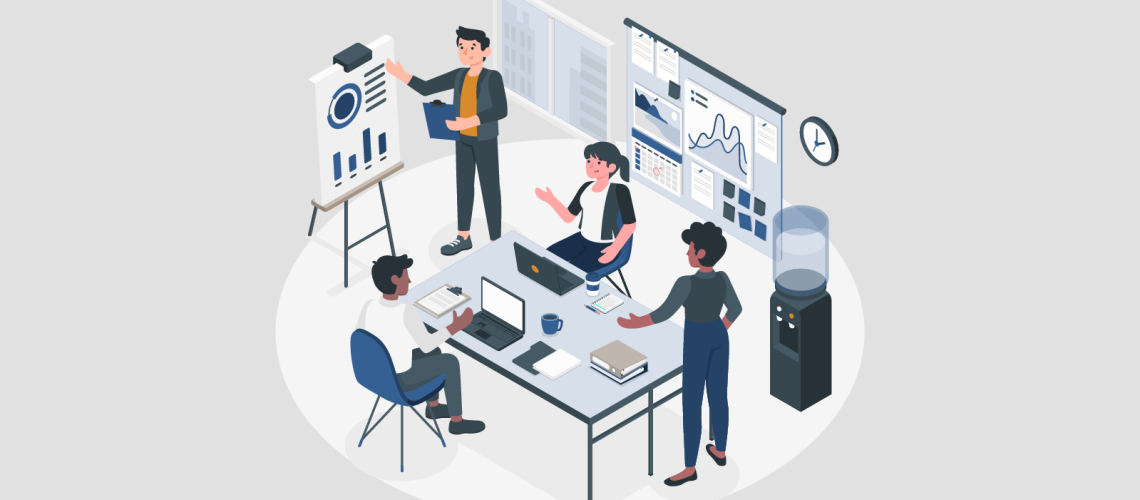Unify and accelerate the path to becoming a data-driven organization.
Highlights
- In this day in age, it is hard to find an organization that does not want to become more data-driven.
- Most organizations have not achieved analytics at scale.
- A modern digital organization is driven by collaboration and communication.
- Center of Excellence can remove barriers to progress.
Data is the oxygen of every organization.
It powers decision-making, strategic initiatives, and more. That is why data is so important to an organization’s success. It is the organization’s fuel.
But one of the biggest mistakes a business can make on its journey towards data competency is to overlook the people and processes behind the data.
A survey by McKinsey found that most companies understand the importance of analytics and have adopted common best practices, but fewer than 20 percent have maximized the potential and achieved analytics at scale.
Establishing a Center of Excellence (CoE) can help drive the collaboration, communication, and framework necessary to deliver results. A CoE is a team or program within an organization that provides knowledge and expertise to unify and accelerate the path to becoming a data-driven organization.
CoEs are necessary to organize governance and drive excellence from an analytics perspective. This article will dive into how to define and establish Centers of Excellence in your company, as well as answer some common questions around best practices, benefits, and challenges.
Sections
- What is a Center of Excellence?
- How should one be organized?
- What are some of the benefits of creating one?
- What are some of the challenges?
- How can we drive business collaboration and communication?
- Center of Excellence FAQs
What is a Center of Excellence?
“A CoE is a physical or virtual center of knowledge concentrating existing expertise and resources in a discipline or capability to attain and sustain world-class performance and value.”
-Gartner
A Center of Excellence (or competency center) is a team of experts who collaborate and communicate to support activities throughout the organization. It helps ensure you have the right talent on staff. But even more importantly, it leverages the skills of various departments to create a return on your investment in those areas.
From a data analytics perspective, this group provides coaching and support to ensure that your firm maximizes its data investment. Organizations can have more than one CoE, as they can be used to facilitate progress throughout the company, from marketing to security.
This blog is a product of a CoE at Iteration Insights. We have a content committee that consists of HR, Marketing, Leadership, and consultants. We discuss key industry trends, customer feedback, SEO strategy, and more. By opening a forum for collaboration and communication, we can include insights in our articles that may have been missed if it were just me writing this alone.
How should one be organized?
A common challenge many businesses face when organizing their CoE is simply deciding who the group reports to within the organization. In the past, many reporting structures would label the team as strictly an IT function. But it’s more than that.
The center should maintain a pulse on the entire organization to understand the priorities of the organization and deliver on those priorities through IT support. This will enable the unit to provide better answers to questions, more informed consulting, and ultimately build out a Central Version of the Truth.
A CoE must have the following to be effective:
- A shared understanding of what’s important to the business
- A list of terms and definitions
- Collaboration and communication
When creating a CoE, consider the following steps:
- Organize your team: Choose people that have high-value skills and experience that will improve data competency.
- Establish a rhythm and cadence: Schedule regular meetings to get momentum and keep that momentum going.
- Define goals and objectives: Make sure everyone understands what the goals are and how they will be measured.
- Invest in the right technology: Choose software capable of handling powerful business analytics and scaling as you grow.
What are some of the benefits of creating an Analytics Center of Excellence?
A lot of businesses will bring technology in to drive digital transformation and improve analytics, but won’t see any ROI on their investment. Most companies agree that collaboration is key to success, but many lack the internal processes needed to fast-track growth. As stated by John Hetherington, to truly get more value from technology, you need to engage your users!
A PWC survey found that three out of five companies say the solution to reaching their strategic goals is collaborating more across functions, paired with faster decision making.
CoE benefits include:
- Removing barriers to progress
- Encouraging collaboration and communication inside of an organization
- Providing consistency in organization structure and tools used
- Promoting efficiency and effectiveness in analytics
- Setting organization architecture
- Grooming data culture and data competencies
- Marketing the value of the team
Collaboration and communication
Most inefficiencies in a company can be boiled down to a people problem. People simply aren’t organized enough. By centralizing communication, you can start to have meaningful discussions that empowers all business functions to understand each other and how everyone fits into overall business processes. Regular communication can establish a good rhythm and cadence that will eventually become second nature.
Efficiency and effectiveness in analytics
A CoE brokers conversations within the organization to expose inefficiencies, establish definitions within the company, and ensure that people from different groups and teams are all on the same page. One of the keys to staying on track to achieve long-term goals is to continually resolve and plan the next steps.
Organization architecture
Building a team of the best-suited people will help improve data processes. Most organizations start to see results as soon as they create the right team of people to work on specific problems.
When organizing your team, remember that you need representation from both business and IT:
- Business representation determines what the team is doing.
- IT representation determines how the team will do it.
Wayne Eckerson suggests the following framework for an Analytics Center of Excellence:
- A corporate BI team including BI developers and administrators, and KPI managers.
- A corporate data science team including data architects, data engineers, platform engineers, Q/A, systems administrators, and DBAs.
- A corporate data management team of data scientists.
Organized and dedicated teams can provide coaching and support as needed to improve Analytics throughout the business.
Struggling with your analytics journey?
Let Iteration Insights get you on the right path, view our services to see how we can help you today.
Data culture and data competencies
CoEs help to build a data foundation from the ground up. People can be brought in with various backgrounds and skillsets, and by collaborating and communicating the team as a unit can grow and build its way to drive data governance and offer improved consulting.
What are some of the challenges?
One of the biggest challenges in any company’s data journey is establishing processes and giving them enough time to take effect. Many companies will invest in data analytics expecting a quick technology rollout and immediate results. Unfortunately, this is rarely the reality.
Think of it this way: 10 years of inefficiencies can’t be solved in three meetings. Investing in establishing a CoE is a transformative process that will achieve lasting results over time.
Here are a few common challenges when establishing a CoE:
- Don’t expect instant results: Data competency must be achieved over time by building little iterations.
- Establish key success criteria: Without an organization-wide plan for measuring success, different teams may use separate criteria. Establish how you will measure success, such as by the number of people trained, number of terms in the dictionary, etc.
- Establish brand awareness: Believe it or not, many CoE implementations fail because people aren’t aware that the teams even exist. Just like you market your products and services, you must also market internal processes.
How can we drive collaboration and communication?
So far, we’ve talked mainly about the people aspect of CoEs. The technology your team is using is equally as important as their skills, knowledge, and expertise.
A robust analytics platform is necessary to provide insight capabilities to CoEs. Your technology must promote evangelizing, training, and support — delivering the right data to the right people at the right time.
Microsoft Teams is a great mechanism in which to help organize and power CoEs. When organized and managed properly, Teams help to coordinate efforts by organizing information in one central location. Here are a few ways that Microsoft Teams can be used to drive collaboration and communication across your organization:
- FAQ and knowledge base capabilities: Threads in Teams can be used to manage conversations, house Q&As, and direct people to correct contacts.
- Improve workflow: Planner tasks keep everyone up-to-date on the latest analytics activities and projects using Kanban boards.
- Improve organization: Housing information and key definitions in one searchable platform improve access to information.
- Schedule meetings in teams: Easily schedule meetings and view calendars to stick to the established rhythm and cadence.
Conclusion
Centers of Excellence make up the central nervous system of any organization. They need to be resilient, collaborating across departments, supporting complex business processes, serving evolving needs, and innovating new solutions. If just one component fails, the data competency of your entire organization is at risk. Continue to achieve efficiency in analytics by establishing CoEs throughout your organization and investing in people, processes, technology, and data. For analytics consulting, contact us.
Need help with analytics in your organization?
Contact us today.
Center of Excellence FAQs
What is a Center of Excellence?
A Center of Excellence is a team of experts who collaborate and communicate to support activities throughout the organization. They provide coaching and support to ensure that your business maximizes its data investment. Organizations can have more than one, as they can be used to facilitate progress throughout the company, from marketing to security.
Does my business need a Center of Excellence?
Most businesses, no matter how big or small would benefit from establishing a Center of Excellence. This will help foster collaboration and communication between internal teams, provide consistency in organization structure and tools, promote efficiency and effectiveness in analytics, and more.
How can I create a Center of Excellence?
When creating a Center of Excellence, consider the following: organize your team, establish a rhythm and cadence, define goals and objectives, and finally, invest in the right technology.
Stay Up to Date with Our Latest Blogs
Subscribe to our mailing list to be notified when a new article is released.



